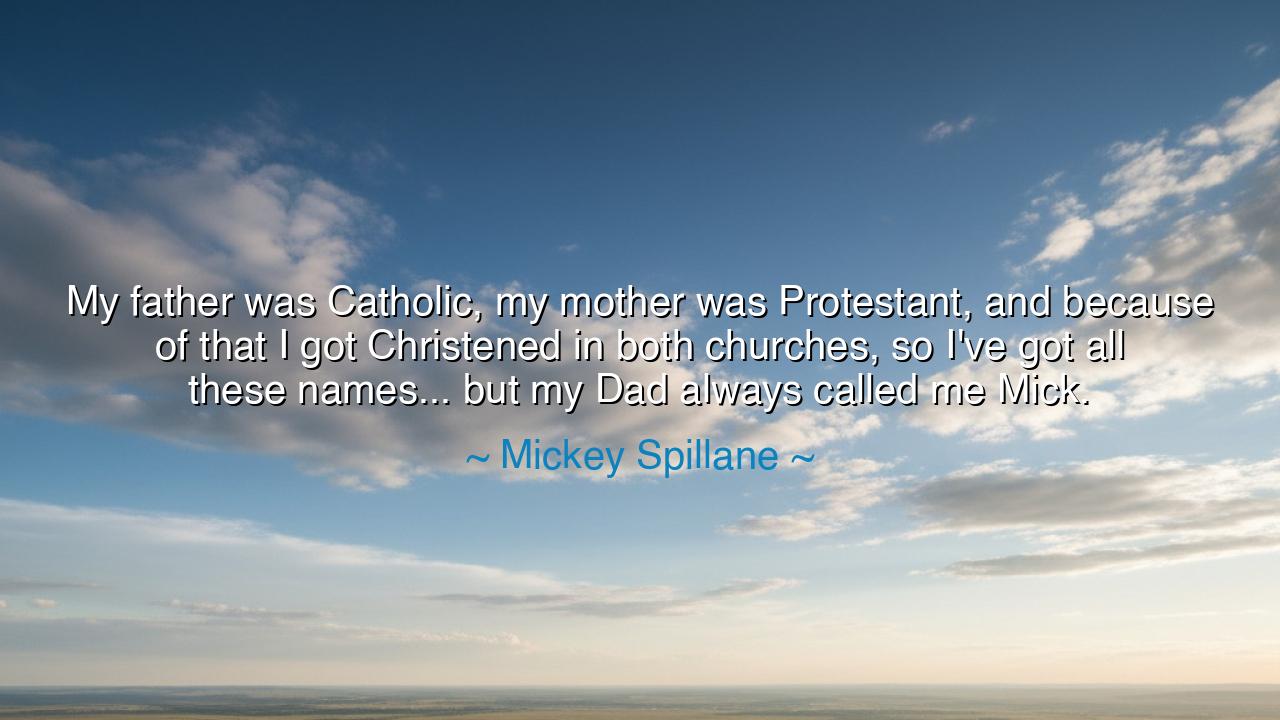
My father was Catholic, my mother was Protestant, and because of
My father was Catholic, my mother was Protestant, and because of that I got Christened in both churches, so I've got all these names... but my Dad always called me Mick.






Hearken, O children of the ages, and listen to the words of Mickey Spillane: “My father was Catholic, my mother was Protestant, and because of that I got Christened in both churches, so I've got all these names... but my Dad always called me Mick.” Herein lies a meditation upon the nature of identity, belonging, and the quiet power of love that transcends tradition. From the dawn of human society, the child born to diverse paths—faiths, cultures, or ways of life—has stood at the crossroads of identity, learning to navigate the vast currents of inheritance while discovering the voice of the heart.
Consider the significance of names. To be christened in two churches is not merely to receive titles, but to be claimed by two worlds, each seeking to shape the soul with its rites, beliefs, and expectations. Catholic and Protestant, ancient and divergent, yet both seek the sanctification of the child. The multitude of names is a mirror of life itself: complex, layered, and full of potential. Yet in this tapestry, one thread—the father’s intimate, singular choice—becomes a compass. The simple utterance of “Mick” conveys love, intimacy, and belonging that transcends the formality of ceremonies and the weight of tradition.
History offers echoes of this truth. Consider John Stuart Mill, raised in the strict tutelage of his father yet exposed to the broader currents of philosophy and learning. His father’s guidance and personal naming of his path shaped him far more than the institutions that marked his birth. Likewise, Mickey Spillane’s life demonstrates that while institutions and rituals may provide structure, it is the personal, the intimate, the daily expressions of care and recognition that shape identity most profoundly.
This story illuminates the eternal tension between public formality and private affection. Rituals, christenings, and ceremonies speak to society’s desire to claim, define, and bless. Yet it is often the quiet, consistent actions of those who love us—the father who calls a child by a cherished name, the mother who guides without grandeur—that shape the soul, teaching the child what it truly means to be known, recognized, and beloved. These are the gestures that endure beyond ritual, that imprint upon memory, and that give life a sense of home.
Mickey Spillane’s reflection also reminds us of the multiplicity of identity. One may be claimed by many traditions, named in many ways, and yet still retain a singular essence, revealed through intimacy and authenticity. The child who navigates dual heritages learns early that identity is not a simple inheritance but a negotiation of worlds. The father’s chosen name, “Mick,” becomes a lodestar, a touchstone of familiarity and grounding amid the multiplicity of external definitions.
From this, practical wisdom emerges. Recognize the power of personal connection over ritual alone. Honor the traditions and ceremonies that shape your life, yet cherish the small, intimate acts that reveal love and recognition. Speak names with care, act with attention, and know that identity is cultivated not only in formal rites but in the tender moments of daily life—the spoken word, the shared meal, the affectionate gesture.
Let the generations remember this eternal truth: identity is both inheritance and intimacy. Institutions and ceremonies provide foundation, but the heart is formed in the quiet affirmations of love, the chosen words, and the daily recognitions that name us as more than titles or rites. Mickey Spillane’s recollection of his dual christening yet singular paternal name teaches us that belonging is not simply granted by society, but earned and nurtured in the private, sacred spaces of family and care.
Therefore, O seeker of wisdom, honor the multitude of your inheritances, yet hold fast to the voices that truly see you. Let love and intimacy guide your understanding of self. Recognize that while the world may confer many names upon you, the names spoken with care, intention, and affection—like the father’s “Mick”—carry the greatest power, shaping the essence of who you are and guiding you through life with both grounding and grace.






AAdministratorAdministrator
Welcome, honored guests. Please leave a comment, we will respond soon